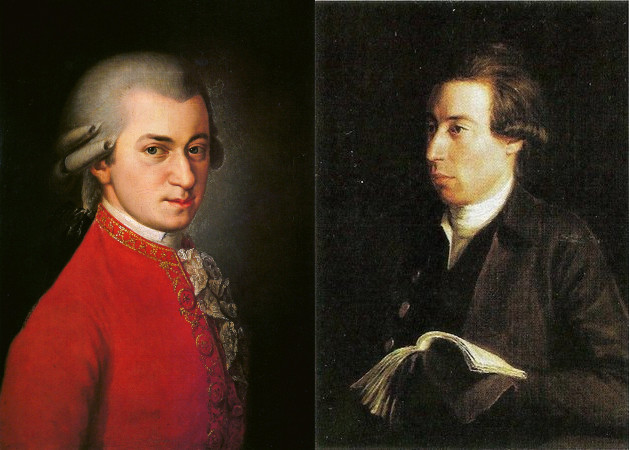
A mystery in music history, or the meeting of Mozart and Kraus in Vienna
By Emilia CampagnaMay 8, 2015
Do you know that Joseph Martin Kraus is called “the Swedish Mozart”? Well, as a matter of fact, it is primarily due to the fact that the two composers were born the same year (1756) and died a year apart from each other, Mozart in 1791 and Kraus in 1792: actually, besides the journeys that both of them did when they were young, they were really far away from each other; Mozart lived mostly in Vienna, Kraus spent the whole life in Sweden.
 But did they ever meet? Did they know each other? The musicologist Bertil Van Boer, who is the author of the complete catalog of Kraus’s works, investigated this aspect to find out if really a metting occurred. In his essay “The case of the circumstantial meetings – Wolfgang Amadeus Mozart and Joseph Martin Kraus in Vienna” he explains that “one of the joys of compiling a thematic catalogue is that a number of small mysteries crop up as one evaluates biographical and source material for the composer concerned. The journey often requires delving into the private life and works in intimate detail, and brings to light important information that in turn raises questions about the various influences or connections affecting the composer or style. But when this information is lacunar or based primarily upon circumstantial evidence, it provides only plausible suppositions that, while not entirely provable as incontrovertible fact, nonetheless dare the scholar to prove otherwise. Such is the circumstantial case for the meeting of two of the more remarkable composers of the second half of the eighteenth century, Wolfgang Amadeus Mozart and Joseph Martin Kraus, who share nearly identical life spans and dates.”
But did they ever meet? Did they know each other? The musicologist Bertil Van Boer, who is the author of the complete catalog of Kraus’s works, investigated this aspect to find out if really a metting occurred. In his essay “The case of the circumstantial meetings – Wolfgang Amadeus Mozart and Joseph Martin Kraus in Vienna” he explains that “one of the joys of compiling a thematic catalogue is that a number of small mysteries crop up as one evaluates biographical and source material for the composer concerned. The journey often requires delving into the private life and works in intimate detail, and brings to light important information that in turn raises questions about the various influences or connections affecting the composer or style. But when this information is lacunar or based primarily upon circumstantial evidence, it provides only plausible suppositions that, while not entirely provable as incontrovertible fact, nonetheless dare the scholar to prove otherwise. Such is the circumstantial case for the meeting of two of the more remarkable composers of the second half of the eighteenth century, Wolfgang Amadeus Mozart and Joseph Martin Kraus, who share nearly identical life spans and dates.”
Indeed, Mozart and Kraus do had something in common, besides the dates. According to Bertil Van Boer “first, there is their development as composers. Both showed considerable talent in musical composition during childhood, with substantial works being written during their teenage years. Both were adept at writing in the various styles of the period, and both were well travelled internationally.” Besides he differences in education (Mozart was essentially home—educated and achieved a professional career early on in his life, while Kraus was university— educated in philosophy and law and became Kapellmeister at the Swedish court only after considerable difficulty “they have much in common in terms of their creative process. Both were well known for the ability to craft new works of some substance quickly and without a laborious compositional process, and both achieved some reputation for innovative orchestration. Both have been seen as being a qualitative step above their contemporaries and this comparison was first proposed by a well known contemporary, Joseph Haydn, who said ‘Kraus was the first great composer of genius that I ever knew; . . . pity about him and Mozart, both were so young when they died’!”
The question whether the two composers knew or knew about each other is still open, because  there is no biographical documentation on this subject, at least as regards Mozart: we can find some evidence on Kraus’s part, in the form of both correspondence and music. “From November 1782 until December 1786 Kraus embarked upon a grand tour of Europe at the expense of Swedish King Gustav III in order to further his own education, observe the latest trends in music and theatre, and meet with as many leading figures in the eighteenth-century musical world as possible. As a result, the route of his journey allowed him to come into contact with most leading composers of the day, including Gluck, Haydn, Salieri and numerous others. While Mozart’s name is clearly missing from this list of notables, it is not necessarily an indication that no meeting took place.”
there is no biographical documentation on this subject, at least as regards Mozart: we can find some evidence on Kraus’s part, in the form of both correspondence and music. “From November 1782 until December 1786 Kraus embarked upon a grand tour of Europe at the expense of Swedish King Gustav III in order to further his own education, observe the latest trends in music and theatre, and meet with as many leading figures in the eighteenth-century musical world as possible. As a result, the route of his journey allowed him to come into contact with most leading composers of the day, including Gluck, Haydn, Salieri and numerous others. While Mozart’s name is clearly missing from this list of notables, it is not necessarily an indication that no meeting took place.”
This doesn’t mean that Kraus and Mozart never met each other, even if we have no evidence: for example, we know for sure that Kraus “was familiar with his colleague and his music”: he wrote about Mozart’s works in letters to his familiars and composed an adaptation of a movement from the opera Idomeneo, and “had inside information on the latter’s latest operatic efforts of Mozart”. Considering the admiration that Kraus had for Mozart “to have avoided him entirely would seem contradictory to the very purpose of Kraus’s goals for his journey.” If they met, it should have happened in 1783: “Kraus arrived in Vienna on 1 April 1783 and departed in October of that same year. Mozart, newly married and enjoying the first success of Entfflhrung, was in residence until July, when he took his new bride back to Salzburg to meet his family. Thus there was a span of about four months where, if nothing else, both were in the same city at the same time.” Vienna was a capital, but even a small city, and the two of them had to have acquaintance in common!
However, the mistery remains: maybe we’ll never know if the two met. We just know that there is a special link between the two composers. In modern times, Kraus is not so known as Mozart, of course, neither so performed: especially for this reason we are particularly proud to have his music repertoire. Besides the fact, of course, that it is wonderful music!
***************************
 Bertil Van Boer is an active musicologist, having published articles in the International Brass Society Journal, Journal of Musicology, Journal of Musicological Research, Svensk tidskrift för musikforskning, and a host of Festschriften and symposium reports. He has regularly contributed to the Grove Dictionary of Opera and Grove Dictionary of Music. He is also the author of several books and numerous musical editions. His specialty is music of the 18th century, particularly in Scandinavia, with focus on the composer Joseph Martin Kraus. He serves as a musical consultant for Naxos Records, and has been involved with the Royal Opera and Royal Swedish Academy of Music on various projects. He has also been conductor with Opera Kansas and performed professionally in Austria, Nicaragua, Sweden, and the United States.
Bertil Van Boer is an active musicologist, having published articles in the International Brass Society Journal, Journal of Musicology, Journal of Musicological Research, Svensk tidskrift för musikforskning, and a host of Festschriften and symposium reports. He has regularly contributed to the Grove Dictionary of Opera and Grove Dictionary of Music. He is also the author of several books and numerous musical editions. His specialty is music of the 18th century, particularly in Scandinavia, with focus on the composer Joseph Martin Kraus. He serves as a musical consultant for Naxos Records, and has been involved with the Royal Opera and Royal Swedish Academy of Music on various projects. He has also been conductor with Opera Kansas and performed professionally in Austria, Nicaragua, Sweden, and the United States.
Bertil van Boer has published “The Musical Life of Joseph Martin Kraus: Letters of an Eighteenth-Century Swedish Composer,” containing the collected edition of the letters by Joseph Martin Kraus (1756-1792) translated from the Swedish and German, along with extensive commentary, as well as appendices featuring documents, a travel diary, and letters from family and friends. The book was published by Indiana University Press.


